
|
The Letter
(1940)
In director William Wyler's and Warner Bros.' superb,
atmospheric, noirish melodrama of murder, betrayal, violence, and
deceit with a stunning Max Steiner score - it was adapted from the
1927 W. Somerset Maugham play of the same name. The story was filmed
once before as the silent The
Letter (1929) with Jeanne Eagels, and remade as The Unfaithful (1947), starring
Ann Sheridan. The socio-political context of the film dared to comment
upon Asian prejudice, sexual hypocrisy and British colonialism. Director
Wyler had again been paired with actress Bette Davis, after their
success with Jezebel
(1938):
- in the shocking and striking opening murder scene
one humid evening, on the grounds of a Malayan rubber plantation,
bored and restless British plantation owner's wife Leslie Crosbie
(Bette Davis) shot and point-blank killed her old family friend
and neighbor Geoffrey Hammond (David Newell) on the porch and front
steps of her home with her husband's gun, pumping six bullets into
the man's body; he staggered out of the tropical bungalow, down the veranda's steps
and fell to the ground
- in an emotional scene, with
cold calculation and manipulation, the proper and refined British
wife Leslie explained to her husband Robert (Herbert
Marshall) (who was away at the time of the murder) and
their hired respected lawyer Howard Joyce (James Stephenson),
that it was justifiable self-defense to protect her honor, against
an aggressive man intent on violating her; she delivered
a dramatic, self-defense narrative and confession about what had
happened the night of the murder (with a pale full moon
and drifting clouds)
- "...When I
walked past him toward the veranda to call the boys, well, he
took hold of my arm and swung me back. But I tried to scream
and he flung his arms about me and began to kiss me. I struggled
to tear myself away from him. He seemed like a madman. He kept
talking and talking and saying he loved me. Oh, it's horrible,
I can't go on...He lifted me in his arms and started carrying
me. Somehow, he stumbled on those steps. We fell and I got
away from him. Suddenly, I remembered Robert's revolver in
the drawer of that chest. He got up and ran after me but I
reached it before he could catch me. I seized the gun as he
came toward me. I heard a report and saw him lurch toward the
door. Oh, it was all instinctive. I didn't even know I'd fired.
Then I followed him out to the veranda. He staggered across
the porch, grabbed the railing, but it slipped through his
hand and he fell down the steps. I don't remember anything
more, just the reports one after another till there was a funny
little click and the revolver was empty. It was only then I
knew what I'd done"
- she claimed that Hammond,
who was married to an Eurasian - Mrs. Hammond (Gale Sondergaard), had
tried to rape her; her husband faithfully believed her [Note:
In fact, she had killed him because as her lover, he threatened to leave
her to take another partner.]
- during the proceedings as Leslie was about to stand
trial in Singapore for murder, Joyce's obsequious law clerk Ong
Chi Seng (Victor Sen Yung) unexpectedly presented Joyce with a
copy of an incriminating letter written from Leslie to Geoffrey
on the day of the shooting, desperately asking to see him; the
inconvenient letter was in the possession of Hammond's widow
- the timely emergence of the letter
revealed her real disoriented motives (she was desperately in love
with Hammond); she wrote that her husband
would be away that evening, and pleaded with him to come - implicitly
threatening him if he did not; it proved that Leslie Crosbie had invited
Mr. Hammond to her bungalow the night of the murder (and that he
was her lover who unwittingly became involved in a crime of passion)
- Leslie's now morally-conflicted lawyer Howard Joyce
commented upon the impact the letter would have: ("This
letter places an entirely different complexion on the whole case.
It'll put the prosecution on the track of - suspicions which have
entered nobody's mind. I won't tell you what I personally thought
when I read the letter. It's the duty of counsel to defend his
client, not to convict her even in his own mind. I don't want you
to tell me anything but what is needed to save your neck. They
can prove that Hammond came to your house at your urgent invitation.
I don't know what else they can prove, but if the jury comes to
the conclusion that you didn't kill Hammond in self-defense...")
- his words caused Leslie to faint and collapse onto the floor
- Leslie tearfully admitted her affair with Hammond; Hammond's
Eurasian wife - who blackmailed them, was offering to sell it for
$10,000 - an amount that would empty her long-suffering husband
Robert's bank account; the retrieval of the letter and exchange
of money had to be conducted personally
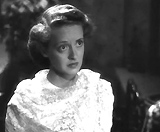
|
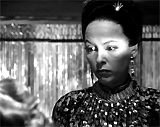
|
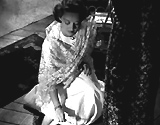
|
|
Leslie's Debasement to Acquire Her Own Incriminating
Letter From Hammond's Seethingly-Angry Widow
|
- in the film's highly dramatic scene of the re-claiming
of the blackmail letter from Mrs. Hammond, Leslie entered through
a jangling bead curtain; in the tense and basically wordless scene,
she offered a personal apology to the seethingly-enraged widow,
and then debased and supplicated herself, by bending down in an
act of penance. She picked up the incriminating letter at her feet,
but then as Leslie rose up with the letter in hand, she reflected
her own smug, arrogant and contemptuous awareness that she had
been able to vindicate herself
- during the subsequent court
trial (held in a white British court with an all-white jury), Leslie
was quickly found innocent of murder charges and acquitted, because
of the suppression of the letter and its incriminating evidence;
Stephenson told the jury it was "a
simple, uncomplicated case" - after Leslie again claimed she
shot Hammond in self-defense
- later, on the night of the acquittal during a celebratory
party, as she was standing on her balcony, Leslie saw a gleaming
dagger planted there; Leslie's
kind and generous push-over husband, although he knew of her
affair, offered to forgive her if she professed her love for him. She
admitted her ultimate betrayal in the final line of the film - that
she still loved the man she killed:
Leslie: You're so kind and generous. You should
have the sort of wife you really deserve. Through no fault
of yours, l've failed you, wrecked your life. l can't ask you
to forgive me.
Robert: lf you love a person, you can forgive anything. (She
hugged him) So, what about you? Can you go on?
Leslie: l'll try. l'll really try.
Robert: That isn't what l was asking.
Leslie: l'll do everything in my power to make you happy.
Robert: That's not enough, unless... Leslie, tell me. Now. This
minute. Do you love me?
Leslie: Yes, l do. (They kissed) No! l can't, l can't, l can't!
Robert: Leslie, what is it? Leslie, what is it?
Leslie: With all my heart, I still love the man I killed! Oh,
no.
- the transgressive heroine Leslie suffered
a fateful retribution in the conclusion; Leslie
went to her balcony, where she noticed the dagger was missing; she
walked deliberately into her own dark tropical garden, where she saw
the outer gate was ajar; shadows came over her as the moon was covered
by clouds; outside the gate in the darkness, she was confronted
by vengeful, retribution-seeking Mrs. Hammond, and another man-servant;
she was grabbed and gagged by the man (to stifle her screams),
and then stabbed to death in the shadows by a flashing dagger in
Mrs. Hammond's hand
- as the two killers were leaving, they were briefly
questioned by an officer. When they walked off (to be detained?),
Leslie's body was revealed on the ground, as the moonlight illuminated
the murder scene
- the film's ending was tacked on, to appease
the Hays Code, that required that she had to pay and be punished
for her indiscretion
|

Opening Shocking Murder of Hammond by Leslie Crosbie (Bette
Davis)

Leslie Crosbie's Confession to Lawyer Howard Joyce

Mrs. Hammond (Gale Sondergaard)
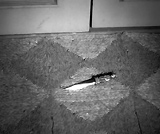
The Dagger
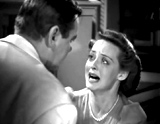
Leslie's Stunning Confession to Her Loving Husband: "With
all my heart, I still love the man I killed!"
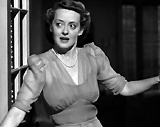
Onto Her Balcony and Into the Garden
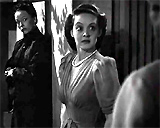
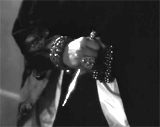
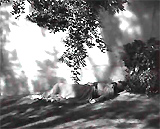
Moonlight Murder Scene - Leslie's Stabbed Corpse
|










